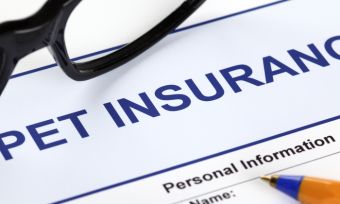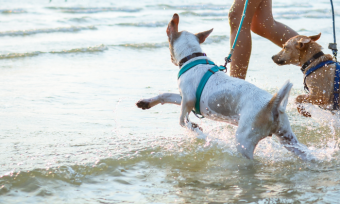While most dogs are happy to eat exactly the same thing every day with rabid excitement, most of us can’t help spoiling them with extra treats. And often, those treats come straight off our own dinner plates, whether a piece of steak or lamb, or just the scraps of rice and vegetables we discard.
But is it a good idea to feed dogs leftovers? And what foods should be avoided?
Should I feed my dog leftovers?
While there are certain foods that are healthy and delicious for both humans and animals, it’s not necessarily recommended to feed your dog leftovers. This is due to a number of reasons:
- It can encourage bad behaviour
- It’s usually in addition to their regular diet, which can lead to weight gain
- While raw or plain foods may be okay, we typically cook our food with oil, salt, sugar, and sauces that may be harmful
It’s also important to remember that just because your pet can eat something, doesn’t mean they should. You’re not only looking to avoid toxic foods but unhealthy ones, too. Dogs can’t handle sodium quite like we can, and high-fat foods aren’t so good for them, either.
If you are going to feed your pet human foods, stick to single-ingredient, healthy foods, free of added flavourings (like salt, sugar or sauces) so you know exactly what they’re eating. And serve it to them as you would their regular meal, not straight off your plate, to avoid encouraging bad behaviour.
Some safe examples could be:
- Carrots
- Cucumbers
- Apples
- Blueberries
- Boiled eggs
- Rice
→Related article: Pet Dental Insurance: Does Pet Insurance Cover Dental Bills?
What foods can dogs not eat?
Below is a list of some common foods that dogs cannot eat, and why. Note that the below list is not a comprehensive list of every food that may be harmful to your dog, and focuses on foods that are particularly toxic. As mentioned above, there are plenty of foods that while not necessarily toxic, can still be harmful.
It pays to always do your research before feeding your pet anything outside of their usual diet.
Chocolate
Possibly the most well-known food that can be harmful to dogs, chocolate contains theobromine, which can cause vomiting, diarrhoea, excessive panting, abnormal heartbeat, seizures or even death.
Grapes and Raisins
Are extremely toxic to dogs, due to tartaric acid in the fruit. Even small amounts can cause kidney failure and be fatal.
Nuts
Certain nuts such as macadamias are toxic, while many others can cause upset stomachs or even blockages. Nuts are also high in fat, which isn’t good for dogs and can lead to pancreatitis.
Alcohol
Dogs’ livers can’t process alcohol, and even small amounts can make them incredibly sick, commonly in the form of respiratory failure. Watch out for alcohol in hidden places, like desserts, sauces and the yeast in raw dough.
Onions and garlic
These two aromatics are regularly some of the first things to go into any pan, and are crucial to making many foods delicious. But they both contain N-propyl disulfide and thiosulfates, which can potentially lead to anemia in dogs.
Caffeine
Dogs react in much the same way as we do to caffeine, only turned up a few notches. A morning cuppa may get us out of bed, but it can cause your dog’s heart rate and blood pressure to rise dangerously, potentially causing tremors and seizures.
If they manage to get a quick lick of some spilt coffee that should be okay (make sure to monitor for any symptoms), but anything more could have serious consequences.
Watch out for foods that contains coffee, such as desserts, coffee grounds and non-coffee products that contain caffeine, such as fizzy drinks and supplements.
Avocado
Avocados contain persin, which is toxic to dogs and can lead to fluid accumulation in their lungs and chest. While avocado flesh has lower concentrations of persin than the skin, and is less toxic to dogs than some of the foods on this list, it’s still best avoided.
What about cats? What foods can cats not eat?
Like dogs, there are plenty of foods that your cat can’t eat. However, poisoning among cats is much rarer, down to the fact they tend to be a bit pickier. Most cats don’t pounce on anything that falls to the floor or dig through the trash when they get peckish…
Below is a list of some common foods that cats cannot eat, and why. Note that, as with above, the below list is not a comprehensive list of every food that may be harmful to your cat, and it pays to always do your research before feeding your pet anything outside of their usual diet.
Milk and other dairy products
Many of us associate cats with a saucer of milk, but most cats are lactose intolerant. However, much like lactose-intolerant humans, cats will happily suffer later if it means indulging in some dairy goodness now.
Lactose intolerance often develops later in a cat’s life, so kittens can handle dairy products better. But it’s best to avoid giving your cat or kitten any dairy products.
Citrus fruits
Contain psoralens, which can cause a pretty severe upset stomach.
All the above
Pretty much any food on the above list for dogs is also bad for a cat, for the same reasons.
→Related article: Pet Insurance for Cats: A Complete Guide
What should I do if my pet eats something it shouldn’t?
Even if your pet has managed to snag just a single grape or a small amount of chocolate, it’s best to get in contact with your veterinarian for more advice or call the NZ Animal Poisons Helpline on 0800 TOX PET (0800 869 738).
If you notice any symptoms in your pet, it may be best to take them to a clinic immediately.
Does pet insurance cover it?
Yes, most insurance policies should cover you if your pet requires medical care due to ingesting toxic foods. However, it might pay to discuss the specifics with your pet insurer, as insurers require you to take necessary precautions and provide proper care and attention.
If there are repeated instances of poisoning, or you give your pet food that is toxic to them (as opposed to them sneaking it without your knowledge) your insurer may feel you are failing to meet the required standard of care and could deny your claim.
Compare pet insurance with Canstar!

About the author of this page
This report was written by Canstar Content Producer, Andrew Broadley. Andrew is an experienced writer with a wide range of industry experience. Starting out, he cut his teeth working as a writer for print and online magazines, and he has worked in both journalism and editorial roles. His content has covered lifestyle and culture, marketing and, more recently, finance for Canstar.
Enjoy reading this article?
You can like us on Facebook and get social, or sign up to receive more news like this straight to your inbox.
By subscribing you agree to the Canstar Privacy Policy







Share this article